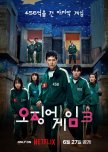
Even If It’s Propaganda — It Doesn’t Change The Fact That It Happened
If you’re watching Dead to Rights (南京照相馆) expecting a safe, dramatized war story, you’re in for a brutal wake-up call.Based on real events during the 1937 Nanjing Massacre, the film follows a postman, A Chang, who pretends to be a photo developer for the Japanese military to survive. Inside this false identity, he secretly turns the photo studio into a temporary refuge for Chinese civilians and soldiers. But in the face of unforgivable violence and horror, A Chang risks everything. Smuggling people to safety and preserving photographic evidence of the atrocities.
The story and visuals are brutally honest. This film does not shy away from the horror. It doesn’t soften the truth to make it easier to watch. Instead, it forces you to sit in the reality of one of the darkest chapters in modern history and to understand it for what it was: genocide, terror, survival, and silent resistance.
The performances in Dead to Rights are just as unforgettable. Every actor delivers with such rawness and restraint that it’s easy to forget you’re watching a movie. There’s no overacting here, just honest, human reactions to inhuman cruelty. I have never jump-scared in a movie before… but the tension in this film had me on edge the entire time. It’s not a horror movie, but the fear feels so real that your body reacts anyway. This isn’t just a film you watch but it’s one you feel in your bones.
But beyond the emotional weight, Dead to Rights is also visually stunning in the most haunting way. The cinematography is rich, atmospheric, and deeply intentional. Every frame felt like a carefully composed photograph, echoing the film’s themes of memory and documentation. The visuals don’t just show violence. They capture emotion, stillness, grief.
Some are calling this film CCP propaganda but honestly, that kind of reaction says more about the discomfort of facing truth than the film itself. You don’t have to take the movie’s word for it. A simple Google search will show you the reality. There are real photographs from the time: babies impaled on swords, civilians shot point-blank in the streets, bodies piled like garbage. These aren't exaggerated for film but they're documented, and they’re horrifying.
Because of Japan’s censorship and silence around this part of its history, many in Japan still grow up unaware of what truly happened in Nanjing. That silence is not just painful, it's dangerous. It allows wounds to stay open and accountability to fade. Dead to Rights may be confronting, but it’s confronting truth. And often, the real thing was worse. Far worse ... than anything a film could show.
There’s also been criticism about young children watching this film and coming away with anti-Japanese sentiment. And while it’s a complex issue, I think we need to ask: why are we blaming the Chinese government for children’s reactions… but not the parents who took them to see a film this raw, this heavy? This is not a movie for kids and that’s clear. But the responsibility lies with the adults who chose to bring them, not the filmmakers who told the truth.
And even if this was CCP propaganda... it wouldn’t change the fact that it happened. The events of the Nanjing Massacre are real, recorded, and undeniable. No amount of political framing erases the truth of what survivors endured. What matters now is that we remember, that we educate, and that we don’t look away.
In the end, Dead to Rights doesn’t just tell a story. It preserves memory. It confronts silence. It says, “Look. Don’t look away. Someone lived this. Someone died here. You can’t pretend it didn’t happen.”
And for that, I believe this film is not only necessary but it’s a masterpiece of remembrance.
Was this review helpful to you?

This review may contain spoilers
I don’t know what is darker — the message and plot of this season or the audience reaction...
If you’re going into this season with the hopes of a happy ending, well… you’re going to be disappointed.Squid Game Season 3 doesn’t hold back. It digs deep into the ugliest corners of human nature. greed, desperation, betrayal and captures them with terrifying precision. This season wasn’t made to comfort you. It’s meant to shake you, and in that regard, it absolutely succeeds.
All of the actors gave absolutely incredible performances. Every single one of them committed so deeply to their roles that it felt painfully, uncomfortably real. They deserve all the awards. Oscars, Emmys, everything. And the show itself? Just as masterfully done. Whether you liked the ending or not, you can’t deny the level of talent on display.
But what shocked me more than the story itself was how people reacted to it. So many viewers are genuinely upset that it didn’t end the way they wanted, like this is some fairy tale where the “good guys” win and everything wraps up neatly. Even worse, I’ve seen countless comments defending player 333’s choice to wanting kill his own daughter for the prize money. Some even said Gi-hun should have gone through with it instead of taking his own life to save the daughter.
I mean… really?
I don’t know what’s darker: the themes explored in this season, or the fact that so many people see the horror and think “Yeah, I would’ve done the same.”
Season 3 doesn’t give you easy answers. It forces you to sit with uncomfortable truths. And maybe that’s why it’s such a powerful piece of storytelling. Not because it tells us what we want to hear, but because it reflects what we might not want to admit about ourselves.
And yes. I understand the controversy around the one particular scene that hints at Netflix turning this into a franchise. I wasn’t thrilled either. But let’s be real: that’s on Netflix, not director Hwang. People forget that Netflix owns the IP. Hwang didn’t even profit from Season 1 (and i highly doubt he earned anything from season 2 & 3 either). That scene wasn’t him selling out, that was him doing what he probably had to do to keep his story alive. Honestly, he probably added it just to make the Netflix execs happy.
That being said, I personally won’t be tuning into a potential American version or spin-off — unless Hwang himself decides to do a backstory series. That, I’d be curious to see. But I’m not going to sit here and say the entire season “sucked” because of one reveal near the end. You watched six hours of brilliant writing, direction, and acting — just because one scene didn’t land for you doesn’t mean the whole thing is suddenly worthless.
In the end, Squid Game Season 3 did exactly what it was meant to do: hold up a mirror. Whether we like what we see in the reflection… that’s on us.
Was this review helpful to you?




